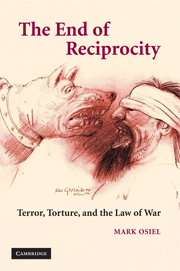Book contents
- Frontmatter
- Contents
- Introduction
- PART ONE RECIPROCITY IN HUMANITARIAN LAW
- PART TWO THE ETHICS OF TORTURE AS RECIPROCITY
- 4 Is Torture Uniquely Degrading? The Unpersuasive Answer of Liberal Jurisprudence
- 5 Fairness in Terrorist War (1): Rawlsian Reciprocity
- 6 Fairness in Terrorist War (2): Kantian Reciprocity
- 7 Humanitarian Law as Corrective Justice: Do Targeted Killing and Torture “Correct” for Terror?
- PART THREE RECIPROCITY IN THE SOCIAL SCIENCE OF WAR
- PART FOUR THE END OF RECIPROCITY
- Conclusion
- Acknowledgments
- Notes
- Index
4 - Is Torture Uniquely Degrading? The Unpersuasive Answer of Liberal Jurisprudence
Published online by Cambridge University Press: 05 June 2012
- Frontmatter
- Contents
- Introduction
- PART ONE RECIPROCITY IN HUMANITARIAN LAW
- PART TWO THE ETHICS OF TORTURE AS RECIPROCITY
- 4 Is Torture Uniquely Degrading? The Unpersuasive Answer of Liberal Jurisprudence
- 5 Fairness in Terrorist War (1): Rawlsian Reciprocity
- 6 Fairness in Terrorist War (2): Kantian Reciprocity
- 7 Humanitarian Law as Corrective Justice: Do Targeted Killing and Torture “Correct” for Terror?
- PART THREE RECIPROCITY IN THE SOCIAL SCIENCE OF WAR
- PART FOUR THE END OF RECIPROCITY
- Conclusion
- Acknowledgments
- Notes
- Index
Summary
Among the many critiques of the Bush administration's counterterrorism policies, the most penetrating and philosophically sophisticated is that of political and legal theorist, Jeremy Waldron. He focuses on torture and concludes that the practice should never be rendered lawful even if it is, he admits, morally defensible in the most extreme circumstances. This stance is wholly uncontroversial as a description of existing law, international and domestic. Yet Waldron oddly insists on resting the theoretical foundation for this anodyne conclusion uniquely on the shoulders of Ronald Dworkin. Dworkin's theory of judging and the conclusions about specific cases that Dworkin has drawn from it over the years are, by contrast, enormously controversial.
Dworkin's views have rightly excited great interest among American legal thinkers for more than thirty years. Their appeal lies in their promise to link practical judgment in real cases to our deepest moral commitments and to do so in a way that explains and justifies key judicial decisions that almost everyone believes were correct but that remain otherwise anomalous – that is, from the viewpoint of more standard theories of what judges, in applying the law, may rightly do. The influence of Dworkin's ideas on practicing bench and bar, to judge from judicial citations, has been almost literally nil, however. These ideas require a belief in some rather contentious propositions: that the law consists not only of explicit rules but also more diffuse principles, often never fully articulated, with a “gravitational force” of uncertain reach beyond the more routine rule formulations within which they are likely to be conventionally codified.
- Type
- Chapter
- Information
- The End of ReciprocityTerror, Torture, and the Law of War, pp. 151 - 165Publisher: Cambridge University PressPrint publication year: 2009

